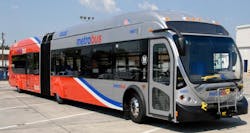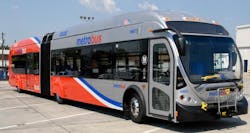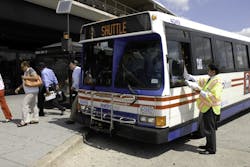Reliability is a fundamental transport requirement
And we needed a study to determine this?
OK, ok, I’ll admit to being a bit too snarky here, because the study in question – dubbed Reliability of Bus Transit Schedules in Washington D.C. and conducted by the Mineta National Transit Research Consortium, a group within the Mineta Transportation Institute (MTI) – highlights some rather interesting factoids about today’s transit bus system networks: especially how taking into consideration current traffic volumes, new traffic patterns, corridor signal timings and headway adjustments can boost on-time arrival performance.
"Before they decide to ride transit, people place great importance on its reliability, especially in urban areas," noted Stephen Arhin, one of the authors of the study.
"Will the bus or train arrive on time? Can passengers make their connections? Will they be standing in the rain waiting for a late bus? This is why most transit agencies set certain performance criteria, including on-time arrival and departure,” he explained. “Our research goal was to determine whether the Washington Metropolitan Transit Authority (WMATA) achieved its own performance criterion for timeliness and to recommend improvements."
The generally accepted standard for "on time" in the transit bus industry is one minute early and five minutes late, according to MTI, while WMATA’s criterion is slightly broader – two minutes early and seven minutes late.
After analyzing 15 WMATA transit bus lines for one year – from the summer of 2012 through the summer of 2013 – MTI’s researchers found that the bus system met its own performance goal 75% of the time, on average. However, WMTA met the industry standard criterion only 61% of the time, on average, MTI found.[It’s interesting to note that in the trucking business, the “on time arrival” metric most often demanded by shippers is 98%.]
The routes studied, by the way, varied from six to 15 miles in length and involved 125 bus stops, MTI pointed out.
As a result of this study, MTI suggested that WMATA schedule periodic “arrival studies” for several “representative” bus routes so it can keep better tabs on its on-time performance, enabling it to make “rolling adjustments” if traffic volumes or other factors conspire to delay bus arrival times.
Another suggestion: conduct a travel and run-time study using automated data collection to gauge the efficiency of bus travel on the most heavily traveled routes, with that data routinely compiled and analyzed for on a three to five year cycle as the “characteristics” of routes (e.g., land-use patterns) could change over time.
In addition to the on-time arrival metric at bus stops, the bus industry as a whole recommends that travel time, dwell time at stops, run time, and transit level of service should also be considered in evaluating schedule performance – pretty basic, as fuel stops, mandatory rest breaks, and re-routes around traffic change travel times for truckers.
In the end, it’s no great surprise that reliability when it comes to meeting on-time performance metrics is a basic requirement for bus transit systems and trucking companies alike. The question is can bus services improve their on-time performance metrics in urban environments that seem to be getting only more congested with traffic by the day. That will be no easy task.


